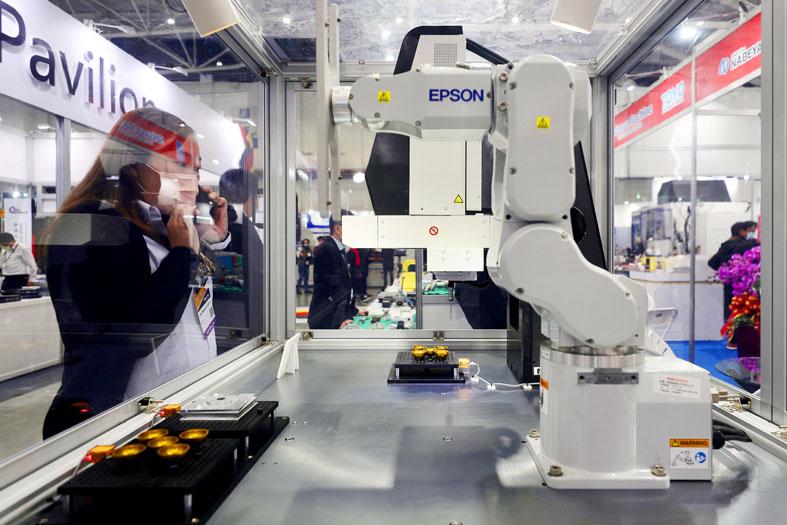The production value of the local manufacturing sector is expected to rise 6.4 percent from a year earlier to hit a record NT$25.8 trillion (US$872.09 billion) this year as Taiwanese tech exporters continue to benefit from healthy global demand and significant investment, the Industrial Technology Research Institute said.
The global economy is facing uncertainty caused by the war in Ukraine, Chinese COVID-19 lockdowns and rising inflation, institute analyst Chen Chia-ying (陳佳楹) said during an online forum on Friday to discuss Taiwan’s manufacturing business climate, industrial sustainability and emissions targets.
However, for many export-oriented manufacturers, output is expected to continue trending higher, with the local economy to grow steadily amid healthy global demand and an increase in private investment, Chen said.

Photo: RITCHIE B. TONGO/EPA-EFE
The four major industries in the manufacturing sector are forecast to see an increase in their output, based on the institute’s model, Chen said.
The information and electronics industry is expected to generate NT$10.32 trillion in production value this year, up 9.28 percent from a year earlier, benefiting from robust shipments in gadgets used in emerging technologies such as 5G applications, artificial intelligence of things (AIoT), high-performance computing devices and automotive electronics, Chen said.
This growth is likely to lead to higher demand for semiconductors and other electronic components, she added.
The production value of the metal and mechatronics industry is expected to rise 6.08 percent from a year earlier to NT$7.37 trillion given the rising popularity of production automation, smart manufacturing and renewable energy development, Chen said.
The output of light industries, such as textile supplies, is expected to rise 2.64 percent from a year earlier to NT$2.76 trillion as many clients of Taiwanese textile producers are to resume efforts to rebuild inventories, she said.
The chemical industry is expected to post NT$5.35 trillion in production value, up 1.92 percent from a year earlier, as the industry faced a relatively high comparison base last year and international crude oil prices are to remain high before moderating from the third quarter, Chen said.
The local manufacturing sector should remain alert for risks from geopolitical tensions and the COVID-19 pandemic, she said.
The institute also forecast that Taiwan’s renewable energy industry would generate about NT$209.5 billion in production value this year, up 5.7 percent from a year earlier, which would be the first time in five years that the industry’s output exceeds NT$200 billion.

CHIP RACE: Three years of overbroad export controls drove foreign competitors to pursue their own AI chips, and ‘cost US taxpayers billions of dollars,’ Nvidia said China has figured out the US strategy for allowing it to buy Nvidia Corp’s H200s and is rejecting the artificial intelligence (AI) chip in favor of domestically developed semiconductors, White House AI adviser David Sacks said, citing news reports. US President Donald Trump on Monday said that he would allow shipments of Nvidia’s H200 chips to China, part of an administration effort backed by Sacks to challenge Chinese tech champions such as Huawei Technologies Co (華為) by bringing US competition to their home market. On Friday, Sacks signaled that he was uncertain about whether that approach would work. “They’re rejecting our chips,” Sacks

NATIONAL SECURITY: Intel’s testing of ACM tools despite US government control ‘highlights egregious gaps in US technology protection policies,’ a former official said Chipmaker Intel Corp has tested chipmaking tools this year from a toolmaker with deep roots in China and two overseas units that were targeted by US sanctions, according to two sources with direct knowledge of the matter. Intel, which fended off calls for its CEO’s resignation from US President Donald Trump in August over his alleged ties to China, got the tools from ACM Research Inc, a Fremont, California-based producer of chipmaking equipment. Two of ACM’s units, based in Shanghai and South Korea, were among a number of firms barred last year from receiving US technology over claims they have

BARRIERS: Gudeng’s chairman said it was unlikely that the US could replicate Taiwan’s science parks in Arizona, given its strict immigration policies and cultural differences Gudeng Precision Industrial Co (家登), which supplies wafer pods to the world’s major semiconductor firms, yesterday said it is in no rush to set up production in the US due to high costs. The company supplies its customers through a warehouse in Arizona jointly operated by TSS Holdings Ltd (德鑫控股), a joint holding of Gudeng and 17 Taiwanese firms in the semiconductor supply chain, including specialty plastic compounds producer Nytex Composites Co (耐特) and automated material handling system supplier Symtek Automation Asia Co (迅得). While the company has long been exploring the feasibility of setting up production in the US to address

OPTION: Uber said it could provide higher pay for batch trips, if incentives for batching is not removed entirely, as the latter would force it to pass on the costs to consumers Uber Technologies Inc yesterday warned that proposed restrictions on batching orders and minimum wages could prompt a NT$20 delivery fee increase in Taiwan, as lower efficiency would drive up costs. Uber CEO Dara Khosrowshahi made the remarks yesterday during his visit to Taiwan. He is on a multileg trip to the region, which includes stops in South Korea and Japan. His visit coincided the release last month of the Ministry of Labor’s draft bill on the delivery sector, which aims to safeguard delivery workers’ rights and improve their welfare. The ministry set the minimum pay for local food delivery drivers at